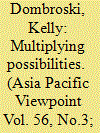|
|
|
Sort Order |
|
|
|
Items / Page
|
|
|
|
|
|
|
| Srl | Item |
| 1 |
ID:
185108


|
|
|
|
|
| Summary/Abstract |
Climate change adaptation is a key shared endeavour of our time. In Thai Binh Province of Vietnam, rice farmers have been adapting to environmental change for generations and have developed sophisticated strategies of paying attention to non-human entities. Such strategies stand in stark contrast to modernist, developmentalist climate change adaptation interventions prioritising mastery and control over the environment. In this article, we think about farmers and other species ‘surviving well’ in the context of climate change adaptation in Thai Binh. We examine the strategies for adaptation already present and the implications of such strategies for climate change adaptation approaches in Vietnam and further afield. We argue that local practices of listening to non-human entities and imagining them as kin can challenge modernist developmentalist approaches to adaptation, providing innovative locally appropriate adaptations. Beyond this, such practices can lead the way in developing non-exploitative and mutually beneficial relationships in ‘more-than-human’ ecological communities for long-term survival.
|
|
|
|
|
|
|
|
|
|
|
|
|
|
|
|
| 2 |
ID:
142636


|
|
|
|
|
| Summary/Abstract |
Postdevelopment thinkers and writers have critiqued development discourse for its role in perpetuating inequality. In water, sanitation and hygiene (WASH) literature and interventions, the discourse used perpetuates inequality through classing anything other than private toilets as ‘without sanitation’. This implies that the people who use forms of hygiene and sanitation relying on collective toilets and alternative strategies are somehow unhygienic. Yet residents of Xining (Qinghai Province, China) rely on hygiene assemblages that do not always include private toilets, but nonetheless still work to guard health for families with young children. In this paper, I develop a postdevelopment approach to hygiene and sanitation starting with the place-based hygiene realities already working to guard health in some way, then working to multiply possibilities for future discursive and material hygiene realities.
|
|
|
|
|
|
|
|
|
|
|
|
|
|
|
|
| 3 |
ID:
185106


|
|
|
|
|
| Summary/Abstract |
This special issue showcases the rich diversity of livelihood practice and more-than-capitalist economic activities enabling communities to ‘survive well’ in the Asia-Pacific. In times of intense social and environmental challenges, where inequality is rife throughout the region, it seems more appropriate to speak of seeking to ‘survive well’ than to ‘flourish’ or ‘thrive’. It is not that flourishing or thriving are not worthy goals, but that the words ring hollow when humans flourish at the expense of non-humans, or when some groups of people flourish at the expense of others, and when so many are seeking merely access to a ‘decent livelihood’ (Duojie, 2022). We return to Miller's (2013) point that in thinking about surviving well we must distinguish between necessity and sufficiency (see also Vunibola et al., 2022). While we have shied away from speaking of flourishing or thriving, bare survival – where species and ecosystem get only what they need to continue in coercive and terrible conditions – is not what we mean by surviving well. Rather, surviving well implies sufficiency – where species and ecosystems, including humans and their environments, get what they need for surviving well together. Togetherness entails effort to achieve justice, equality and ongoing sustainability not just in and between human communities but in wider more-than-human networks of labour, value and livelihood. In this collection of articles, we see the ingenuity and empathy of communities throughout the region, seeking to survive well not only as individuals, but as collectives.
|
|
|
|
|
|
|
|
|
|
|
|
|
|
|
|
|
|
|
|
|